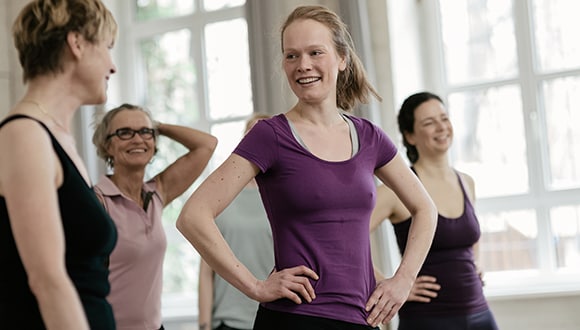The importance of fitness in your 40s
If you’re in (or edging close to) your 40s take note; building exercise into your life can boost your health, now and in the future.
Karen Burge
July 2017
Your 40s can be one of the most empowering times to set healthy habits now and for the years ahead. Yet many Australians in this age group find it a challenge to get the recommended amount of exercise.
If you’re struggling to get moving – or to be as active as you once were – you’re not alone. The Australian Institute of Health and Welfare’s (AIHW) Australia’s Health 2016 report shows that 45% of Aussies aren’t doing enough physical activity and of the 45-55 age group, 56% fall short of meeting current exercise guidelines.

Medical matters
As we tip into middle age, bone density and muscles mass starts to decline, as does your metabolism. You might have to push that little bit harder, or work out in a different way, to get the same results as when you were younger.
General health can also start to slide. Professor Kylie Ball, Principal Research Fellow at Deakin University's Institute for Physical Activity and Nutrition, says our 40s is a life stage when many of us begin to experience the onset of chronic disease.
The good news is that exercise can positively influence your current and future health path.
“Physical activity decreases the risk of many of these diseases, including coronary heart disease, type 2 diabetes, breast and colon cancers, and poor mental health. It also maintains/improves blood pressure and cholesterol, helps maintain body weight and healthy muscles and bones, enhances cognitive functioning and extends life expectancy,” Professor Ball explains.
“While a healthy diet is important, it isn’t enough to ward off the adverse health impacts of a sedentary lifestyle.”
Getting results
The great thing about physical activity is that every bit helps, Professor Ball explains.
“Benefits can be seen even with small amounts, particularly amongst people who were previously inactive. So it doesn’t matter if you’ve never exercised before – starting now will bring immediate and longer-term benefits.”
“Greater benefits accrue with consistent activity over time, so you should be aiming to develop a habit of at least 30 minutes a day on most days, and to keep this up over time. Your 40s represent an ideal time to establish habits that set us up for good health into mid-life and your senior years.”
Weekly targets
Adults in their 40s (in fact anyone aged 18-64) should aim to be physically active for 2.5 to 5 hours per week, at a moderate intensity; or half of that for activity of vigorous intensity.
“10 minutes of vigorous intensity activity is equal to 20 minutes of moderate intensity activity, so for those who are time-poor, trying a couple of runs, vigorous swims or cycles can be a more efficient way to squeeze this in,” says Professor Ball. “Walking is a fabulous moderate-intensity activity that can be done almost anywhere and requires very little skill, cost or equipment.”
It’s also recommended that you include muscle strengthening exercises at least 2 days a week.
“This can be particularly important from our 40s on – it can include things like using hand weights, or doing push-ups, squats or lunges, or simply tasks around the home that require lifting or digging.
"It’s important to also keep track of time spent sedentary, since sitting for long periods is an independent risk factor for ill health, even among those who are active at other times.”
Accentuate the positive
Fiona Cosgrove, managing director of Wellness Coaching Australia, is well versed in getting people motivated. She believes our 40s is the perfect time to embrace exercise.
“We have greater self-knowledge. We don’t strive for unrealistic results and hopefully we’re more comfortable in our own skin,” she says. “Our reasons for exercising are probably different to what they were in our 20s – it’s not about measuring up any more but more about maintaining a sense of pleasing ourselves, not others.”
While it would be great if exercise was an ingrained habit by this age, Cosgrove says, for some it might be a time to ease off and for others a time to gather more momentum.
“In this day and age we have so many exercise options. Make it your own choice and individualise your program. Do you like working out alone or with others? Do you enjoy music, water, dancing or competition? Do you feel the benefits of yoga? Perhaps your exercise program might be more about de-stressing from a high pressure job?”
However you choose to exercise there’s no doubt your health will benefit from the get-go and your future self will thank you for it.
Related articles
Which cardio is right for you?
Longer sessions at a moderate pace or short and intense? Here's what you need to know.
Exercise for healthy bones
Bone health is a key factor in ageing well and exercise can help you build stronger, denser bones.
What kind of exerciser are you?
From people player to weekend warrior, learn to enjoy your workouts and stick at them.
Is running good for you?
Some say running will add years to your life, others that it'll age you prematurely. Get the facts.